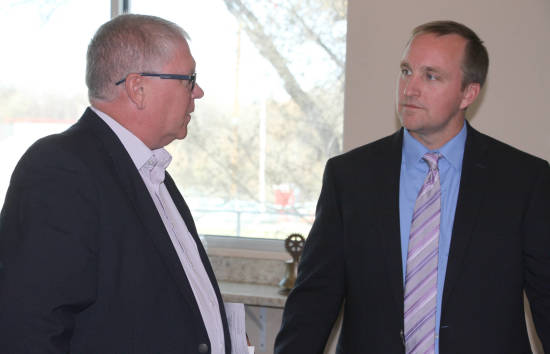Group strives to provide data for good decisions

McCOOK, Neb. -- Good government depends on a good grasp of the numbers, think-tank representatives told a local service club Tuesday.
“We believe that good decisions are informed decisions,” OpenSky Policy Institute Communications Director Chuck Brown told the McCook Rotary Club at its noon meeting. He and Alex Serrurier, a Weitz Fellow working with the institute, were in McCook to share OpenSky’s research on taxes, budgets and school finance, which is gathered to share with lawmakers and decision-makers. Brown told the gathering that 93 percent of the state’s budget goes to fund five areas: K-12 education (28%); higher education (17%); health and human services, non-Medicaid (17%) Medicaid and CHIP (20%); public safety and law enforcement (11%).
“So when we start talking about budget cuts, that’s where it will come from. Also, when there is an increase in the budget, those are the areas we are talking about.”
Brown said that reductions in state aid to local governments are often offset by increases in local tax (property taxes). As Nebraska has attempted to reduce the tax burden for its citizens by cutting state aide to schools, local property taxes have increased.
When compared to other states, Nebraska’s K-12 schools rely heavily on local taxes for funding (59%) and less on the state sources (33%). In other states, the average is about 47% local and 45% from the state. Recent OpenSky research shows that residents in highly agricultural counties pay more in property and income taxes than those in areas with less agricultural land. The average annual property and income tax burden for rural residents is $4,250 compared to $2,750 in other areas. “This is a flip in the dynamic of what people used to think,” Brown said.
Brown also warned that Nebraska’s “rainy day fund” is departing from a healthy balance. Good fiscal practice would dictate that Nebraska keep a cash reserve of 16% of state general fund receipts. These funds are used when tax revenues fall short due to the economy or natural disasters. Presently, Nebraska is at about 7%, according to Brown. The forecasting board has recently upgraded their forecast of tax receipts, and Brown said that keeping those increased receipts in the rainy day fund would bring the state back to about 12 percent, “which is better, but still not where you want to be.”
According to Brown, many economic forecasters are calling for a recession as early as 2020, so maintaining a healthy tax reserve will be really important to maintain the services that the state provides. Brown cautions that viewing the projected surplus to fund property tax relief could be perilous.
Brown said that the key is to understand that the numbers are just projections. “That would be like if we said Nebraska was going to win the West and banked on it at the beginning of the football season. That’s what they’re talking about; winning the West to pay for tax cuts.” Brown contends that actual receipts and projections rarely match.
Since 2006, the legislature has passed “a bunch of tax cuts”, according to Brown. In addition, tax incentives have spiked in recent years. The majority of Nebraska’s tax base comes from individual income tax (50%); sales tax (35%) and corporate income tax (7%). Brown said that Nebraska’s sales tax was set up in the 1960’s when we had a goods-based economy. “It has since shifted to a service-based economy, and we don’t tax a lot of services. We tax a lot of goods, not many services. As a result, sales tax doesn’t really reflect our economy. We don’t generate the revenue from it that we could and that contributes to our revenue challenges.”
Brown said that the biggest topics in the upcoming legislature would be property tax reductions and tax incentives, neither of which was accomplished in the previous legislature. Discussions will include broadening the base by eliminating sales tax exemptions and using that to increase education funding; which should reduce local property taxes. Other topics may include increasing the sales tax rate, spending caps, and using projected increases in revenue to fund property tax relief.
A proposed 2020 ballot initiative would create a refundable income tax credit of 35% of property taxes paid. Brown said it would result in a $1.5 billion hit to the state’s budget that equates to 32% of the general fund budget. The proposal would require big cuts to healthcare, public schools and roads while at the same time require increases in other taxes and fees.
Brown also discussed LB720, which is the economic incentive program that will replace the sunsetting Nebraska Advantage Act. OpenSky is concerned that LB720 shares some of the same qualities of Nebraska Advantage, particularly as it relates to revenue impact and transparency issues. “We’re working with lawmakers now and talking about the use of caps and other fiscal restraints. Right now, the incentive programs are-you apply for them, and if you meet certain criteria, you get them, whether or not you meet the state’s strategic needs.”
